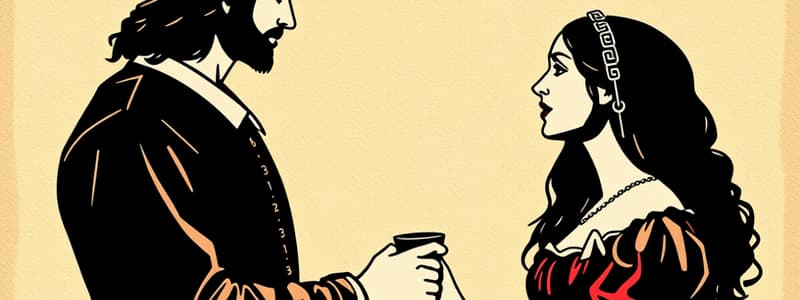Podcast
Questions and Answers
'Sad hours seem long' context?
'Sad hours seem long' context?
A sense of sadness in Romeo's tone of language, contrasting with his reaction to Juliet later in the play, making us question whether he knows what love really is and showing his immaturity.
'She doth teach torches to burn bright' significance?
'She doth teach torches to burn bright' significance?
Romeo shows his admiration towards Juliet when he first sees her.
'What light through yonder window breaks' analogy?
'What light through yonder window breaks' analogy?
A biblical reference comparing Juliet to an angel, signifying peace and purity.
'It is my lady, O, it is my love' implications?
'It is my lady, O, it is my love' implications?
'Arise fair sun, and kill the envious moon' meaning?
'Arise fair sun, and kill the envious moon' meaning?
'O if I were a glove upon that hand' significance?
'O if I were a glove upon that hand' significance?
'Heaven is here' interpretation?
'Heaven is here' interpretation?
'But Romeo may not' meaning?
'But Romeo may not' meaning?
'If thou dost love, pronounce it faithfully' assertion?
'If thou dost love, pronounce it faithfully' assertion?
'I have no joy of this contract tonight' concerns?
'I have no joy of this contract tonight' concerns?
'Thy purpose marriage, send me word tomorrow' significance?
'Thy purpose marriage, send me word tomorrow' significance?
'I beseech you on my knees' implications?
'I beseech you on my knees' implications?
Juliet in Act 4, Scene 1 represents?
Juliet in Act 4, Scene 1 represents?
'These violent delights have violent ends' warning?
'These violent delights have violent ends' warning?
'The sweetest honey is loathsome in his own deliciousness' meaning?
'The sweetest honey is loathsome in his own deliciousness' meaning?
'My brother Montague give me thy hand' significance?
'My brother Montague give me thy hand' significance?
'My child is yet a stranger to the world' context?
'My child is yet a stranger to the world' context?
Flashcards are hidden until you start studying
Study Notes
Key Quotes & Analysis from Romeo & Juliet
-
"Sad hours seem long" reflects Romeo's deep sadness, contrasting with his later feelings for Juliet, raising questions about his understanding of love and suggesting his immaturity.
-
"She doth teach torches to burn bright" conveys Romeo's admiration and awe for Juliet upon first seeing her, highlighting her beauty.
-
Romeo compares Juliet to an angel with "What light through yonder window breaks?...As is a winged messenger from heaven," incorporating biblical imagery that associates her with purity and peace.
-
The pronoun "my" in "It is my lady, O, it is my love" signifies possessiveness, illustrating themes of ownership in a patriarchal society and emphasizing Romeo's claim over Juliet.
-
"Arise, fair sun, and kill the envious moon" metaphorically contrasts Juliet's beauty against the moon, representing darkness and his past love for Rosaline, showcasing the overpowering nature of his feelings for Juliet.
-
"O, if I were a glove upon that hand, that I might touch that cheek" indicates Romeo's desire for physical closeness to Juliet, suggesting both romantic and sexual intention.
-
"Heaven is here" reveals Romeo's perception of Juliet as a divine presence, elevating her character to one of purity and beauty.
-
In "But Romeo may not," the third-person reference hints at Romeo's feelings of unworthiness and foreshadows his tragic fate, suggesting a loss of identity without Juliet.
-
Juliet's assertiveness in "If thou dost love, pronounce it faithfully" illustrates her strength and desire for honesty in her relationship with Romeo.
-
"I have no joy of this contract tonight; it's too rash, too unadvised, too sudden" expresses Juliet's inner conflict and hesitation regarding their hurried marriage, highlighting her maturity.
-
In her demands regarding the marriage, Juliet defies 16th-century expectations of women, portraying traditionally masculine qualities and asserting her agency.
-
"I beseech you on my knees" symbolizes Juliet's submission to her father, using her posture to plead against the arranged marriage to Paris, revealing the power dynamics in their relationship.
-
In Act 4, Scene 1, Juliet's emotional turmoil overtakes her rationality, showcasing her vulnerability while emphasizing the influence of Friar Laurence in her decisions.
-
"These violent delights have violent ends" uses juxtaposition to convey danger in intense passions, foreshadowing the tragic ending of Romeo and Juliet's love story.
-
"The sweetest honey is loathsome in his own deliciousness" serves as a metaphor for the duality of love; it may refer to Juliet's sweetness contrasting with the bitterness stemming from their feuding families, or to Friar Laurence's sinful involvement in their union.
-
"My brother Montague give me thy hand" marks the reconciliation between the Capulet and Montague families, highlighting the resolution of their long-standing feud.
-
"My child is yet a stranger to the world; she hath not seen the change of fourteen years" suggests Juliet's youth and inexperience, providing context for her vulnerability while reinforcing themes of adolescence.
Studying That Suits You
Use AI to generate personalized quizzes and flashcards to suit your learning preferences.




